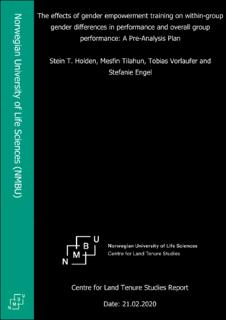| dc.contributor.author | Holden, Stein T. | |
| dc.contributor.author | Tilahun, Mesfin | |
| dc.contributor.author | Vorlaufer, Tobias | |
| dc.contributor.author | Engel, Stefanie | |
| dc.coverage.spatial | Ethiopia | en_US |
| dc.date.accessioned | 2020-08-21T13:11:18Z | |
| dc.date.available | 2020-08-21T13:11:18Z | |
| dc.date.issued | 2020 | |
| dc.identifier.uri | https://hdl.handle.net/11250/2673444 | |
| dc.description.abstract | This Pre-Analysis Plan is for a Randomized Control Trial (RCT) for recently formed youth business groups in Tigray Region of Ethiopia. Resource-poor rural youth are given a business opportunity by being allocated a rehabilitated land area where they can establish a joint business. They are organized as a primary cooperative and self-organize with a board of five members including a leader and a vice leader. The overall objective of the project is to identify factors that enhance the performance and sustainability of formal youth groups as a business and livelihood option. The project includes three RCTs and this registration is for one of these RCTs. This study is an RCT that aims to investigate the benefits of training elected female group members in this setting where male group members dominate as group board members and leaders in most groups. The training will consist of training in production planning and marketing and use of mobile phones for these purposes. An additional effect of the training is also to create social networks and professional contacts across groups among female members that receive the joint training.
Ethiopian culture is patriarchal, and men have traditionally been household heads and taken up almost all leadership positions in the society. Recent legal reforms in the country have strengthened women’s land rights (Holden et al. 2011). Less is known about the position of women in business. They are supposed to have equal rights to men as members of primary cooperative businesses that we study. However, they are outnumbered by men in such business groups (38% of the members are women), are less likely to be board members (only 24% of the female group members against 38% of male members are board members), and much less likely to be group leaders/vice group leaders (only 4% of females and 22% of males are in such positions) (Holden and Tilahun 2019b). Female group members are also less likely to own mobile phones (31% of female against 72% of male members (Holden and Tilahun 2019b). Mobile phones are instrumental in doing business such as for marketing, organization of groups, and contacting authorities. | en_US |
| dc.language.iso | eng | en_US |
| dc.publisher | Norwegian University of Life Sciences, Ås | en_US |
| dc.relation.ispartofseries | CLTS Report;2020:1 | |
| dc.rights | Attribution-NonCommercial-NoDerivatives 4.0 Internasjonal | * |
| dc.rights.uri | http://creativecommons.org/licenses/by-nc-nd/4.0/deed.no | * |
| dc.title | The effects of gender empowerment training on within-group gender differences in performance and overall group performance: A Pre-Analysis Plan | en_US |
| dc.type | Report | en_US |
| dc.subject.keyword | Agriculture | |
| dc.subject.keyword | Labor | |
| dc.subject.keyword | Youth employment | |
| dc.subject.keyword | Cooperatives | |
| dc.subject.keyword | Women | |
| dc.subject.keyword | Empowerment | |

